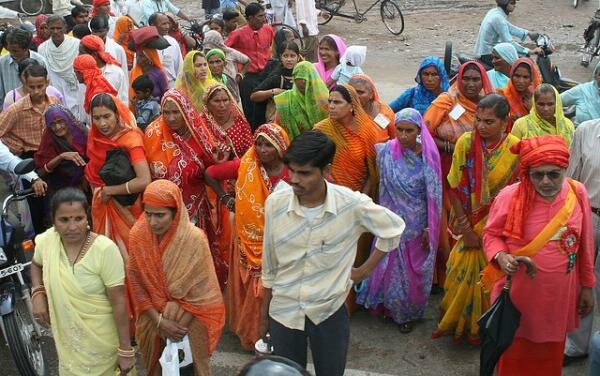Have Sari, Get Respect?
Female teachers at a state college in Bhopal, India, have been told they must wear saris while on the job so that they are more respectable.

A local government college in Bhopal has banned jeans pants for lady teachers instructing them to wear saris while in the campus.
A spokesman of the management of Sarojini Naidu (Nutan) College said that the decision was taken to instil Indian culture in the college.
He said that till now, teachers were wearing salwar suits, kurtas and jeans – of which it was sometimes difficult to distinguish between them and students.
The spokesman said that a similar decision on enforcing a dress code for students would also be enforced from the next session.
“A dress code for students cannot be enforced during the middle of an academic session,” he said.
Or watch the news here.
“There is a personality of a teacher. You are standing wearing anything, or jeans that look vulgar, that is not right. Even students do not respect you as they think. So, this is very important,” said Pandit.
Should colleges be telling the students that traditional clothing makes a female look 'respectable'? And so not wearing a sari does exactly the opposite?
Why is a salwar kameez – very much a traditional Indian outfit - less respectable?
One assumption could be that the sari makes a woman look older. Also, traditionally in some parts of India, all married women must wear saris. I have blogged about meeting someone who thought that married women who do not wear sari are doing it behind their in-laws’ and husband’s backs.
Another bit of information, the Bombay High Court held that a marriage can’t be ended over a sari.
The college could to be trying to say that a teacher in a sari is seen as older and ‘respectably married’ (or at least marriageable).
This is how stereotypes are created.
Is it okay for a college to ask the students to associate ‘respect’ (or honour!) with sari and vulgarity with jeans?
“In thousands of ways, our culture has conditioned us to anticipate rape as a natural consequence of violating social norms.” These misconceptions are responsible for women blaming themselves for sexual crimes against themselves (…makes it easier for those who don’t care to take action).
The male teachers are not expected to wear dhoti and achkan. Doesn’t the college think the students need to respect the male teachers too? Why teach the students that double standards and gender bias are acceptable?
Has the college really given this some thought? There are many who think the sari is sensual. Jeans are actually seen as comfortable and easy to wear, and the sari as dressy by many others. Some feel the sari is not easy to maintain or move in, and not weather-appropriate, while jeans and salwar kameez are.
Shouldn’t an adult female (like the rest of the population) be trusted to decide what is appropriate for her to wear?
Also consider why is it so essential for the female teachers (if at all) to look different from students? What if a teacher continues to look like one of the students (i.e. young and unmarried) no matter what she wears?
And most importantly, shouldn’t an adult female (like the rest of the population) be trusted to decide what is appropriate for her to wear?
Compare this news from Bhopal to this news from Lahore,
"Jeans, Body Hugging Dresses Banned in Lahore College fearing Terror Threats".
This post was originally published in The Life and Times of an Indian Homemaker in December 2010.

















